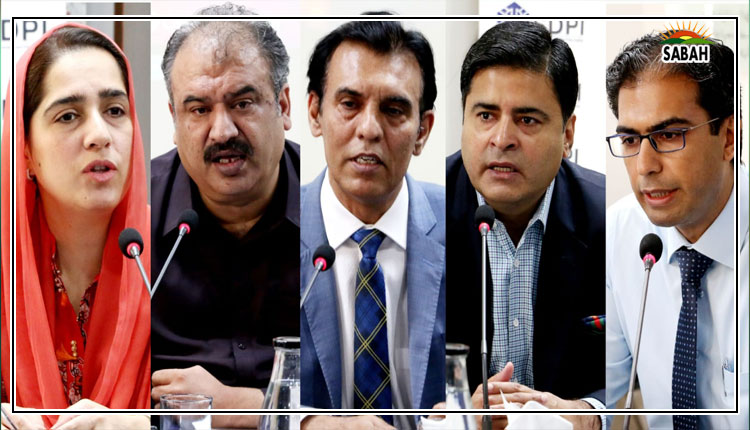Speakers for a dedicated track & trace system for uncovered retailers, & informal sectors to improve taxation targets
ISLAMABAD, May 27 (SABAH): The Speakers at a pre-budget consultative session on Monday demanded the government to ensure a dedicated track and trace system to bring the retailers, and businesses from the informal sectors with progressive taxes into the tax net to generate revenue from untaxed sectors.
The Sustainable Development Policy Institute (SDPI) organized the consultative discussion titled “Pre-Budget Seminar: Tax Reforms in Agriculture, Retail and Real Estate Sectors”.
In his opening remarks, Dr. Abid Qaiyum Suleri, Executive Director, SDPI said the consultation was convened to observe the overtaxed sectors in the budget whereas the International Monetary Fund (IMF) in its discussions emphasizing to bring the real estate, IT, and agriculture sectors under the tax net.
Dr. Suleri underlined that it was imperative to unearth the bottlenecks faced by the above three sectors in paying taxes as they were not only important for the upcoming budget but also in the runup to IMF negotiations to provide a complete picture of current taxation status and proposed taxation plan’s implications. He added that these sectors were willing to pay taxes and it was necessary to consider their suggestions in the policy-making processes.
Dr. Vaqar Ahmed, Joint Executive Director, SDPI said the pre-budget consultations are high in demand from the government partners for independent consultations and the IMF also wanted to have it timely as it would not only guide the government but also the Fund during its next program discussion.
He added that it would show the economic trajectory in the next 2-3 years. “We have discussed three sectors: retail, agriculture, and real estate. A large informal sector, challenges in implementing track-and-trace systems, the Federal Board of Revenue’s (FBR) POS system, and the growing number of online retailers evading taxes contribute to the difficulty of collecting taxes in the retail sector. While discussions regarding fixed taxes on retailers are ongoing, the question of fairness and progressivity within such a system remains unanswered,” he added.
Dr. Vaqar mentioned that due to the informal nature of the agriculture sector, calculating and collecting the actual tax liability in the sector has proven challenging. He added that tech-based solutions were offering promising solutions for improved accuracy.
Ahsan Zafar Bakhtawri, President, Islamabad Chamber of Commerce, and Industry (ICCI) said the retail sector was paying taxes in the country, but it was crucial to integrate the retailers who were not part of the system.
He demanded the government to develop a proper track and trace system with the support of the law enforcement agencies (LEAs) that could identify the non-tax paying retailers who were doing billions of rupees annual business but did not pay taxes. For instance, he said that the leading tobacco or pharmaceutical companies should not supply their products to retailers who lack NTN or national tax numbers. “Tobacco companies selling imported cigarettes are costing Rs350 billion revenue losses per annum,” he added. The POS integration system needs to integrate all retailers otherwise it would lead to massive erosion in the market balance among competitors, he added.
Afaq Tiwana, CEO Farmers Association of Pakistan said the under discussion three sectors shared a common challenge of bringing the informal sector into the tax regime. He mentioned that the agriculture sector was paying taxes in three tiers that also included a tax return issued from the patwari that levies a cumulative 15% tax. He added that although it was an informal sector, its land records were digitized and was digitally documented economy. “The taxation should be made fair along with deregulation of the agriculture sector which is important as the government should reduce its involvement in our regime and bring us into tax net which should be a voluntary fixed tax regime,” he said.
Ahsan Malik, Senior Real Estate Analyst said there was a trust deficit between the regulators and the sectors not paying taxes which needed to be bridged through a fair and progressive tax regime. He added that the FBR regulatory and enforcement measures were further depleting the trust of the masses as the tax-paying entities and non-taxpayers should be treated separately. Development and housing societies running and thriving businesses in the sector were evading taxes as the real estate partners were not willing to pay for the government’s inefficiency and incompetence, he added.
“Local industry needs to be promoted whereas imported luxury items should be taxed. We need to give space to small farmers and retailers. The new regime should make less burden on already taxed sectors,” Malik said.
Sumera Abbasi, Executive Director TiE said there was a need to bring clarity among the startups and small businesses with proper categories of retailers to ensure an inclusive tax regime. She said many retailers particularly poor women avoid paying taxes due to laborious paperwork that makes women entrepreneurs not interested in taxation. She added that stringent tax regulatory regimes have failed to provide a conducive environment for startup growth.
“Compliance cost needs to be reduced and made fair for local masses, whereas women in startups are not discussed during the budget which should discussed more clearly,” Sumera Abbasi noted.












